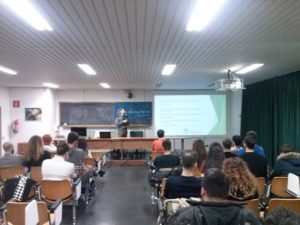 The EPS-YM section of University of Calabria has organized a cycle of seminars on nanospectroscopy and, moreover, on novel applications of nanomaterials.
The EPS-YM section of University of Calabria has organized a cycle of seminars on nanospectroscopy and, moreover, on novel applications of nanomaterials.
The seminar on nanospectroscopy has been focused on the novel concept of “nanospectroscopy” and the speaker has been dr. Antonio Politano.
Methods and techniques to perform spectroscopy with a nanometric spatial resolution and to the investigation and discovery of new phenomena at the nanometer scale at the interface between physics, chemistry and biology have been presented.
In particular, the study of nanostructured materials necessitates analytical methods that combine spectroscopy with electron microscopy. The feasibility of nanospectroscopy at synchrotron radiation sources has been addressed, with some examples of beamlines already open to users.
The seminar on nanomaterials has addressed novel applications recently developed. We have tried to recruit as speakers both PhD stud-ents of other departments and post-doc from our department, under the coordination of Marco Alfano. Nanomaterials can be used for energy engineering as nanofillers in novel Li-ion batteries in order to reduce the problems of silicon microparticles currently used. Furthermore, nanomaterials can be used for devising novel applications in chemical engineering.
During the talk it has been clarified that many critical issues remain unresolved in current energy systems such as low charging rate, low energy and/or power density, poor cycle life, poor thermal management, and low environmental sustainability, impeding broad adoption in new engineering applications. Therefore, the development of new, green materials and technologies is essential to design energy systems with comprehensive out-standing electrochemical, thermal and mechanical properties. In particular, graphene is a suitable platform for electrochemical energy storage and conversion devices. Moreover, scalable production of such energy materials/devices is imperative to realize the transition from laboratory-scale materials to industrial applications.
The participating categories were mainly undergraduate and PhD students.
After the end of the seminar, we have organized a round table of 30 minutes on the problem of energy.
Refreshements with some snacks and beverages have been offered in each seminar.
